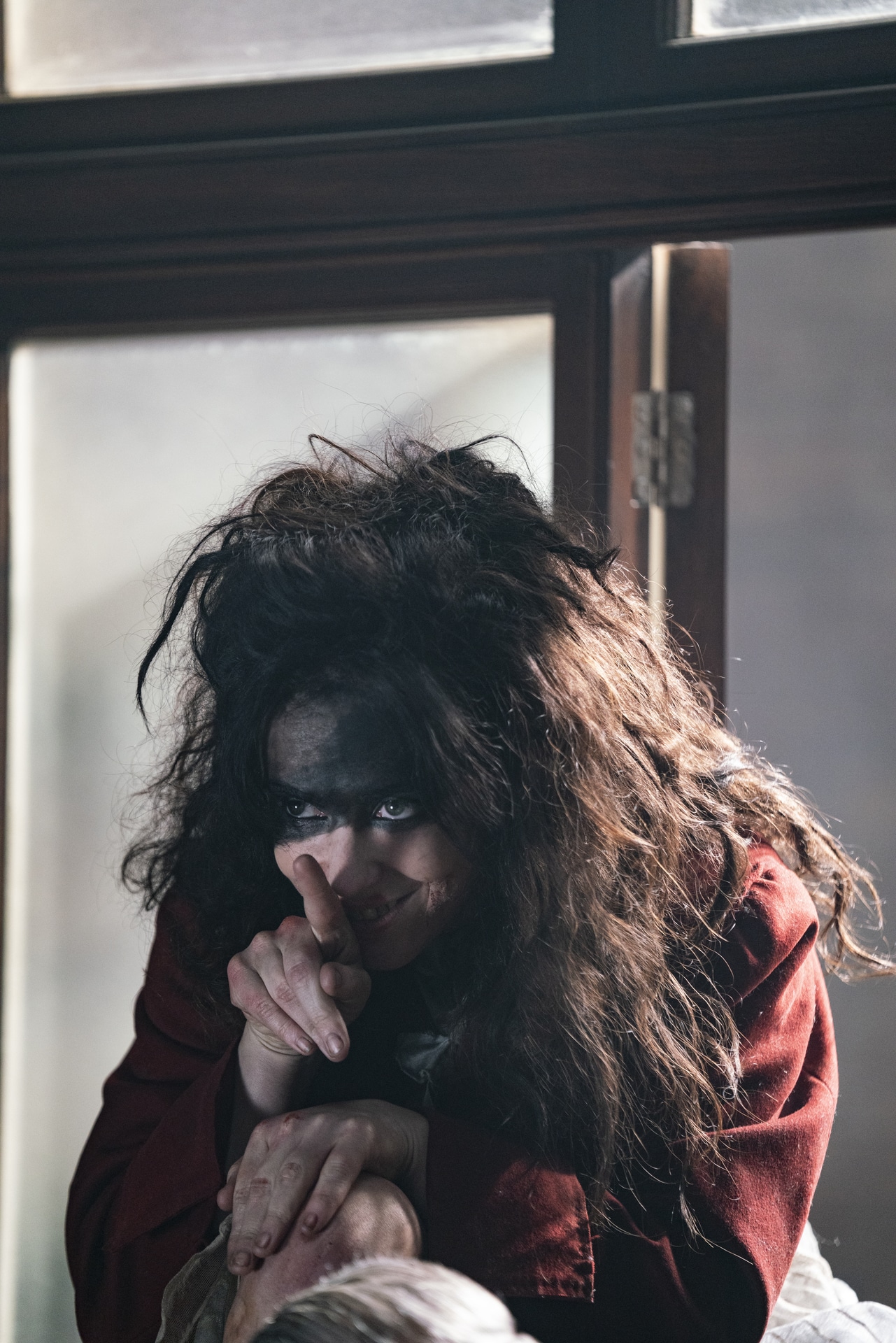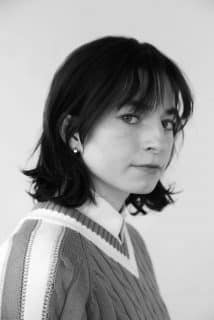Amy Manson on playing one of TV’s greatest villains
Culture
An interview with Amy Manson about her role as Maladie in The Nevers, and how she maintained her mental health while delving into the mindset of such a disturbing, yet somehow appealing, character...
If you have seen The Nevers – and if you haven’t, you will probably have noted the noise around it at least – of all the attention-grabbing steampunk, mysterious super-powers and Victorian underworld intrigue, it is the villain, Maladie, who really grabs the viewer by the throat. Amy Manson’s performance as Maladie, the murderous scourge of both the ‘Touched’ (those who suddenly find themselves with strange abilities, let by Amalie True (Laura Donnelly)) and the ‘Untouched’, immediately reminds you of that connoisseur of chaos, Heath Ledger’s Joker. Except there is an added depth to Maladie, a conflicted angst and embittered rage, that, as revelations through the series show, has trauma at its route. You sympathise with Maladie as much as you abhor her. We spoke to Amy about the performance, the making of the show, and managing her mental health…
Can you describe the show for us?
It’s a band of sisters coming together in a world where they’ve been ostracised by society because of something that has been imposed on them. Something that they’re not in control of. So it’s about these women forging relationships and figuring themselves their new powers out.
Every time I’ve watched an episode, it just feels that I’m in a new world. I’m in a new genre, almost. It’s an amalgamation of so many genres that it’s hard to pinpoint, but there’s definitely a fantastical kind of steampunk element. I love that.
And can you tell us about your character? Maladie is quite something – how did you get the part and build the character?
She’s a wild one, for sure. I think I had to keep an element of her playing and having fun and holding a mirror up to society. That was what I had to hold on to or else she just becomes this weighted ball of pain – inflicting pain on the people who inflicted pain on her. So I tried to keep that element of her playing at the forefront of my mind.
She was called Mabel in it for audition purposes, but from the start I tried to pick apart her and the scene and the riddles that she talked in. And I kept coming to this: there must be a problem with her mind. Why is this? Why can’t she string a sentence together? Why is she speaking in all these clues? And that was where the exploration started with Maladie. It’s been a ride, a dark ride at times, and I’ve gone down some rabbit holes in my research for the part. But then at the same time, I tried to think that she had so much pain inflicted on her by this evil doctor, and she could have had different outcomes in life, and she chose to become that vigilante. She chose the path of revenge rather than taking her own life or other outlets. I kind of take my hat off to her resilience and her need to seek revenge against this evil doctor and his cronies.
What kind of research did you do? What were you looking into?
I had to make a decision because you see her going into an asylum as who she was before she became Maladie. She’s this Victorian woman called Sarah, who had a partner, and I had to make the decision – is she psychotic? Does she have a mental illness prior to going in?
And me and Joss both agreed that she didn’t. At the time, a lot of men would use mercury to poison their wives, to send them into mental institution to pave the way for younger models.
While Maladie is going into this asylum in a vehicle, she thinks she sees God, this spark, this light, and that is something that’s in the ether. So she goes into the asylum saying that she’s had her ‘road to Damascus’ moment and she’s the next Jesus Christ. And, of course, people think that she’s insane.
To get to that state, I looked a lot of women serial killers to get to the level, but I just thought that wasn’t the right route to go down. It was more about accounts of women who had gone through abuse and came out the other side but are still left with PTSD.
I got to the stage where it resonated that her frequency is that of mania. I tried to go into what is mania. And sometimes I ended up on really disturbing stories of gang rape, things like this, and how the women that survived deal with their traumas on a day-to-day basis.
That level of insight really helped to get into a headspace to give it truth, or else it just becomes one note. When each time somebody looks at her in the eye, it’s something different, it’s a different experience, and it’s different traumas that have all built into this volcano. She’s bound to erupt, and she does. She keeps operating on that level, because if she stops and opens up, then she feels and she doesn’t want to feel. Instead, she’s operating on this pain threshold.

You can see that immediately with the character, how kind of conflicted she is. Almost questioning what she’s saying to herself half the time, trying to make sense of her own actions as she’s doing it.
Yeah, I think so. Later in the season we delve into actually what went on with her at the hands of ECT machines. I read up on what that can do to the brain, but I definitely kept coming back to this PTSD.
Because of her thought patterns that change so quickly, that made it a hard head space for me to get into, so I had to put it in my body and say a sentence and quickly turn for instance. There were little techniques that I used just to kind of make her thoughts make sense, you know, because she switches on a dime, and it’s just making that real. That was the hard job for me anyway.
It must have been exhausting, I imagine.
Yeah, but I think now I know how to protect myself. I knew that I needed my own time prior to going on because I can’t really switch her off once I’m in that head space. She’s just got a constant mission in her head, this revenge, and it all makes sense to her, but to a world looking in, these are terrorist actions that she’s carrying out on society.
I’m always a big advocate of fitness, especially for my own mental state every day. If I don’t get some fresh air or do some sort of fitness, then game over. I try to keep on top of that.
Acting must be a profession that puts a lot of strain on mental health…
Definitely. In my day-to-day life I’ve actually found that CBD really helps with nerves. What I find is when I’m performing or auditioning, it does help to take that edge off the little angsty butterflies. But with Maladie where it’s all coming out with this verbal diarrhoea, constantly switching around, it didn’t really help in that way. I just had to manage.
With characters like this, I have to go to the gym after. Even though I’ve been giving this energy, it’s my way to wind down rather than come home and have a glass of wine. I just need to get whatever’s in my head out of my body because it’s a different person’s energy. The whole frequency that she’s vibrating on.
I went through so much, you know, like training myself up every day for her. And I’ve never done that for a performance before.
It was just coming from instinct that she was reacting on the spot because she’s just a big bubble of energy. She doesn’t know what she’s going to do at any time, and that’s how I needed to feel in my body – that I just react to what’s in front of me.
Did you have to do any sort of fight training or weapons training and that kind of thing as well?
Yes. That was fun. And Laura was a great sparring partner, too. We had about six weeks before filming, just to concentrate on routines and sequences. Doing that on top of having Malady’s illogical language to learn, that was my mission. Every day.
Was it a hard script for you to get your head around, dialogue-wise?
Yeah. Definitely. I tried not to think about the words initially because for the audition Josh wrote this scene, which turned out to be something he wrote in five minutes, but I spent weeks trying to pick apart every line and word. I asked him what it all meant. And he was just like, “nothing.” It was just audition purposes. We had a laugh at that.
So I said, right. The words are the last thing I need. I need to find the frequency of her and how she vibrates and why she’s operating in this level. And then the language comes on top of it.
Can you tell us how lock down affected the production?
So we got shut down in March last year. I ended up going and working for a charity in Scotland for four months, which was lovely. And then got a call back. So we started up again, and by that time they had made the decision just to do the first six episodes. HBO said that we’re not going to pick up anything until the following June. So we start again this June.
But going back on set again, all the good had to be put in plastic and brought to our trailers and things like that, and they’d gone so far to build these pathways on the sides of the building that we’re filming in, just to keep certain departments away from other departments. Which is a shame because you lose the camaraderie and the spirit of what it means to be a united force on set. But we were all being tested three times a week, which was a godsend, a lot of production don’t have the luxury of that.
How was the last year been for you in general?
It’s been weird because I live in London, and I haven’t been in London the whole time. As I say, I was in Scotland helping with this charity for children with learning difficulties, and it was all outdoor work, land maintenance, planting trees, painting, so that kept me out of trouble. And then in the afternoons, I just got on the bike or went hill walking. So I just had the luxury of living in the Highlands in the middle of nowhere, which was really wonderful and I did a lot of thinking. And then I came back to film, which was weird because you get picked up in the morning and then take it to set and back home. But I was just so grateful to be working. And then this year, I’ve been away in Germany filming.
But I see why everybody finds so tough, you know? I actually host every morning with my close girlfriends and some of the cast from The Nevers, a keep fit session that was started last year by Riley, who’s the head of stunts. Now there’s about eight of us that do it every morning. And it really does set everybody up for the day.
Exercise became one of the things that people realised they needed, and you’re a big advocate for the mental health benefits aren’t you?
Yeah – for me, it’s about being in your head too much. I think breathing and meditation and yoga and keeping fit reminds you that you’re inhabiting your body. It takes you away from your mind. And makes it a constant choice every morning. It’s hard, you know, but you can say, I choose to have a good day. You know, I choose to write out a little journal, with basic things: what am I going to do today? What am I grateful for?
It might be that I’m grateful for my legs to be able to go out and walk. Some people can’t even do that. It can be anything. To have money, to have a computer, to be able to talk to you right now. These little things bring you back again to your body. And then the more that you’re grateful for the miniscule things in life, the easier it becomes just to live rather than exist. Everybody’s just got to help themselves. You can do a sit up right now. You can get yourself up, call a friend, or even starting off at walking up and down your flat. It’s there for the taking.
It’s a great way to bring back the control, isn’t it? And sometimes when you’re going through mental health problems, you don’t feel like you’re in control of anything, so at least move back to yourself.
Well, that’s it. And I think, to be honest, the last couple of weeks I thought, why am I drinking again? I’ve gone through what people did in the first lockdown. I’ve just been kind of, ‘I’ll have a wine tonight.’ And then by the weekend it’s just gone. I was like, ‘wait, wait, wait. That’s why I feel I’m existing.’ So I thought, right. Back onto healthy eating, healthy mind, breath work every day, and I feel great.
I need to go out in the fresh air. I know that’s what helps me. That escapism. Even just putting in my Earpods and getting out and listening to breath work as I walk around the park just to bring you back to yourself.
Have you got anything else you can sort of tell us about?
We’ve got the second part of the season for The Nevers. I talked to Laura this morning, so we’re all on tenterhooks waiting for that. And then, I was just doing a film with Pablo Larrain called Spencer, about Princess Di. Another project about mental health. So that will be in November. It’s about a certain time in her life, and her mental state at the time. Steven Knight wrote it, who’s done Peak Blinders, so it’s great.
Who is looking after The Nevers now with Josh Whedon gone?
Philippa Goslett. And she’s great. She’s wonderful. We’ve each had Zoom meetings with her, just discussed plot and character development and where we’re going forward. But it’s just going to have to be a new show now. Going forward, we just have to kind of compartmentalise and just go, right, it’s unfortunate that we don’t have the big man at the helm anymore, but we just need to move forward because it’s about us now. And that’s the thing with Josh it was always about the work and always about the actors. He gave so much to all of us and we’ve still got that. We need to feel secure as a unit. This is the best show I’ve ever worked on in my life with the nicest human beings I’ve ever worked with. Nobody can take that away from us. And that’s all we can do going forward. Philippa fits in wonderfully. It’s a team production.
And just finally, what have you sort of personally learned from this past year?
It’s okay to have boundaries. I think I’ve been too much of a people pleaser. That’s caused me anxiety in the past. I think by not having the pressure of needing to attend things and so many people relying on you physically, it kind of made me think that actually, I can just be there for friends and family members via Zoom or on the phone. That would be one thing.
And also talking about the phone, I hate that contraption, I have to turn it off every day because it just gets a bit too much. You end up going down a rabbit hole, which isn’t healthy for your mindset.
I’ve always been outdoorsy. The majority of the population would probably say they’ve learnt to get out more and keep fit, but that side of my life always been taken care of. So I would say more on the technological side and just protecting my space, I guess.
Just being kind to myself, and understanding that the times when I’m lonely, I’m not alone. And truly understanding that.
There’s a quote that I’ve got actually in the house, and it says, ‘Being alone, I recharge my battery.’
I got that when I did a play about 12 years ago, and it’s only this year that I understand it now. That’s what I mean about being feeling lonely, but not being alone. I just have to take myself away and go, actually, more alone time for me makes me stronger. Then I can give.
Whereas I think I was giving so much and wondering why at the end of the day, I’m exhausted. People can only give so much, you know, and then you think it’s a duty because it’s your family and your children. But actually, if you just shut off from everything for an hour in whatever way, that building strength again, isn’t it?
Catch up with The Nevers on Sky.
Photo by @jemimashoots.
Follow Amy on Instagram.
Trending

Join The Book of Man
Sign up to our daily newsletters to join the frontline of the revolution in masculinity.

















